-
Adopt
-
Veterinary Care
Services
Client Information
- What to Expect – Angell Boston
- Client Rights and Responsibilities
- Payments / Financial Assistance
- Pharmacy
- Client Policies
- Our Doctors
- Grief Support / Counseling
- Directions and Parking
- Helpful “How-to” Pet Care
Online Payments
Referrals
- Referral Forms/Contact
- Direct Connect
- Referring Veterinarian Portal
- Clinical Articles
- Partners in Care Newsletter
CE, Internships & Alumni Info
CE Seminar Schedule
Emergency: Boston
Emergency: Waltham
Poison Control Hotline
-
Programs & Resources
- Careers
-
Donate Now
Our social media feeds are full of pictures of dogs and cats with a few extra pounds and captions like “Embrace the chub,” “Fluff and stuff,” or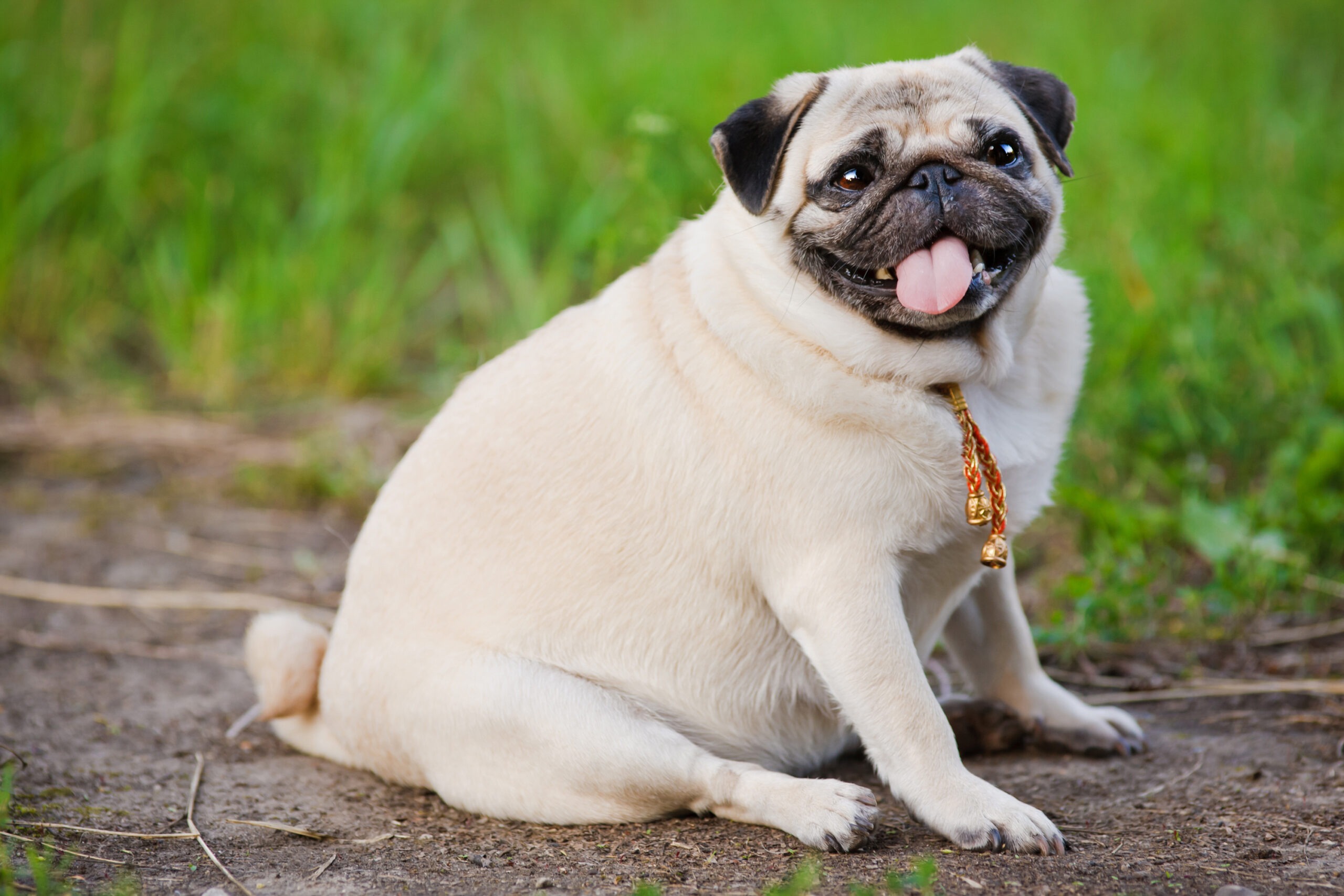 “Chonk life.” At first, we laugh and hit “like” because, after all, isn’t a roley-poley puppy adorable? But the sad reality is that these animals are overweight, unhealthy, and probably not very happy.
“Chonk life.” At first, we laugh and hit “like” because, after all, isn’t a roley-poley puppy adorable? But the sad reality is that these animals are overweight, unhealthy, and probably not very happy.
Obesity in pets is one of the most common preventable diseases. Maintaining your pet’s weight can be challenging, however. Keeping our pets’ weight in check can help them live long, happy lives or even help them live longer healthier lives. We spoke with General Medicine specialist Dr. Julie Shields about pet obesity at the MSPCA-Angell West for insights and advice.
Pet obesity is more common than you think
Weight issues are more than just a problem for humans in the US. The obesity epidemic in pets is growing. According to Dr. Shields, obesity is diagnosed when a cat or dog exceeds 30% of its ideal body weight. “And about 2/3 of pets are overweight in the US,” she said.
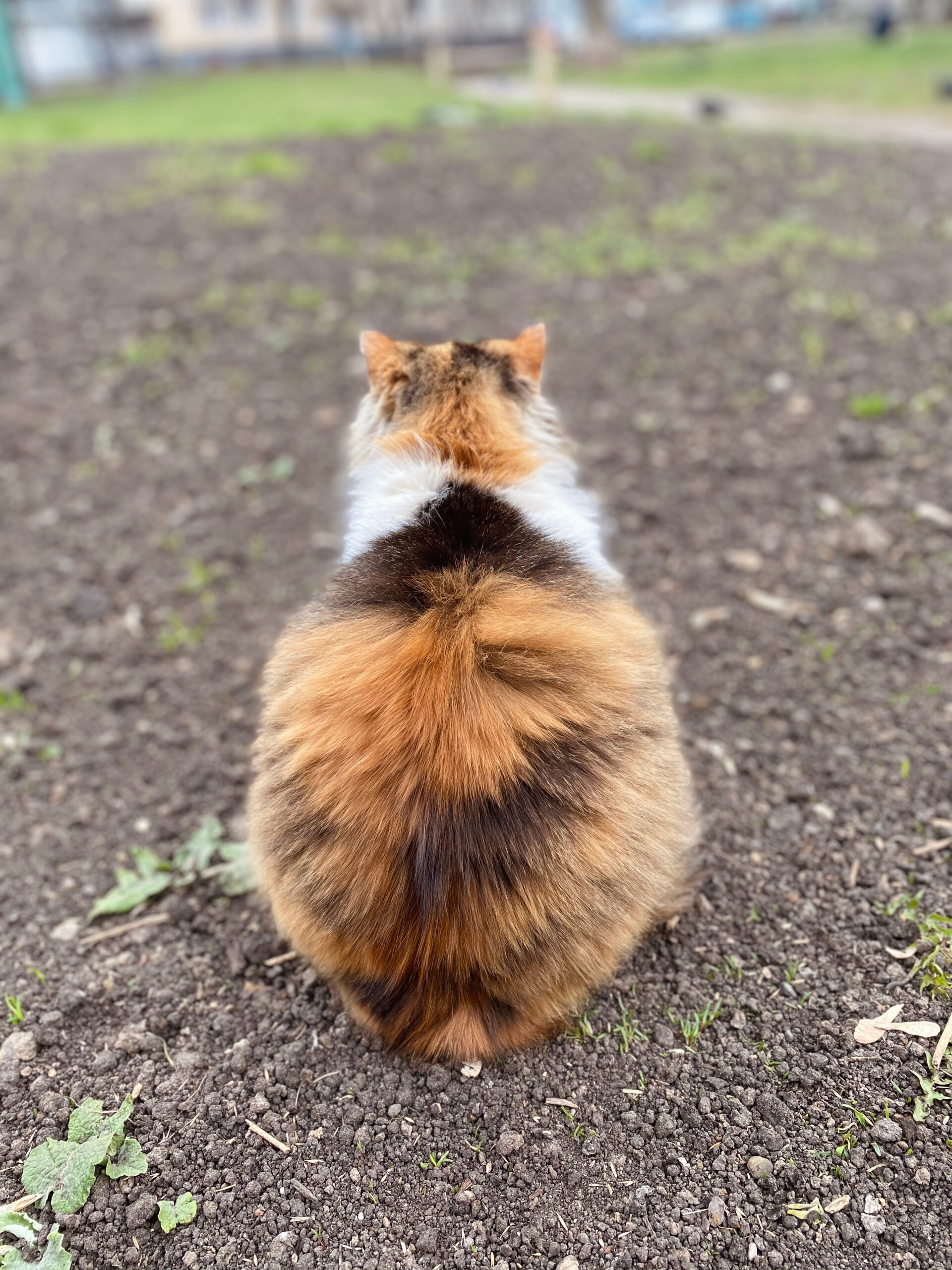 Both overfeeding and insufficient exercise contribute to pets gaining weight, as does the breed when it comes to dogs and cats. Golden and Labrador retrievers, cocker spaniels, beagles, and pugs tend to gain weight. While Maine Coon, Norwegian Forest, and Raggamuffin cats are more prone to overeating and inactivity.
Both overfeeding and insufficient exercise contribute to pets gaining weight, as does the breed when it comes to dogs and cats. Golden and Labrador retrievers, cocker spaniels, beagles, and pugs tend to gain weight. While Maine Coon, Norwegian Forest, and Raggamuffin cats are more prone to overeating and inactivity.
Though there’s a good chance your pet is overweight because it overeats and doesn’t exercise enough, it’s still a good idea to consult with your family veterinarian to rule out any medical issues. “Sometimes it’s more than just the extra treats and table food – underlying conditions, like hypothyroidism and hyperadrenocorticism/Cushing’s disease, could be causing the extra weight,” said Dr. Shields.
What’s a healthy weight?
Humans can determine whether we have gained or lost weight by looking at the scale. It’s a little more challenging with pets. Several factors go into determining a healthy weight, including breed, age, and body shape. “We use body conditioning scoring to assess whether a dog or cat carries too much weight,” said Dr. Shields. A body condition score (BCS) is based on how much fat your pet has at a few key locations on their body. Using a 9-point scale, the vet can decide if your pet is at an appropriate weight (4 to 5 range) or at an unhealthy weight (everything over 5 is considered overweight).
Dr. Shields advises owners to take a good look at their pet’s body shape from looking above. “If it seems your dog or cat no longer has a waist, then it’s a definite sign a change in diet is needed,” she said.
Below are two handy infographics about body condition scores for dogs and cats that also explain further about body shapes.
DOGS
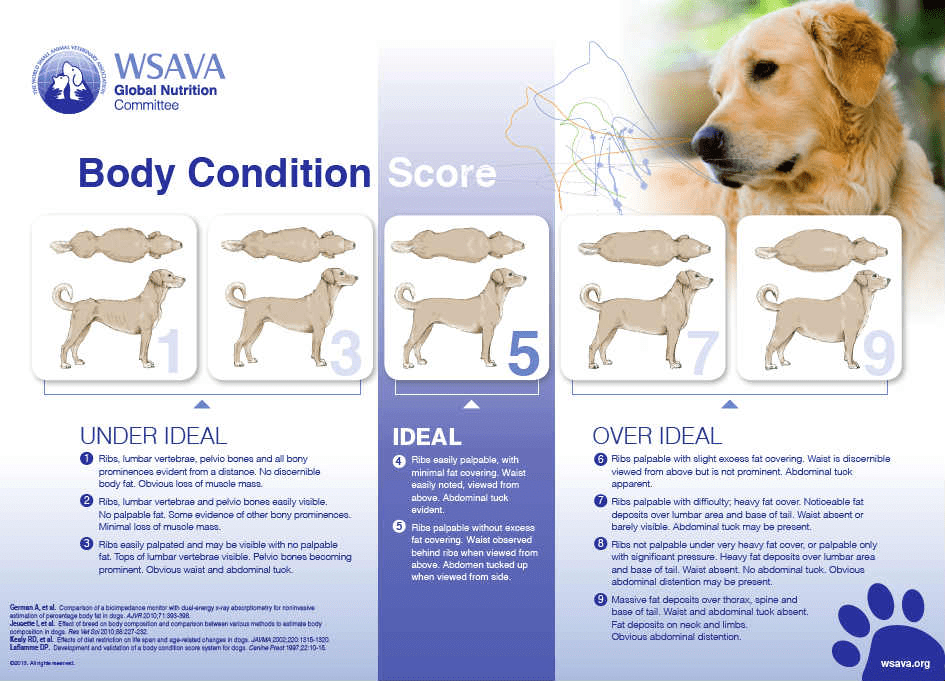
x
CATS
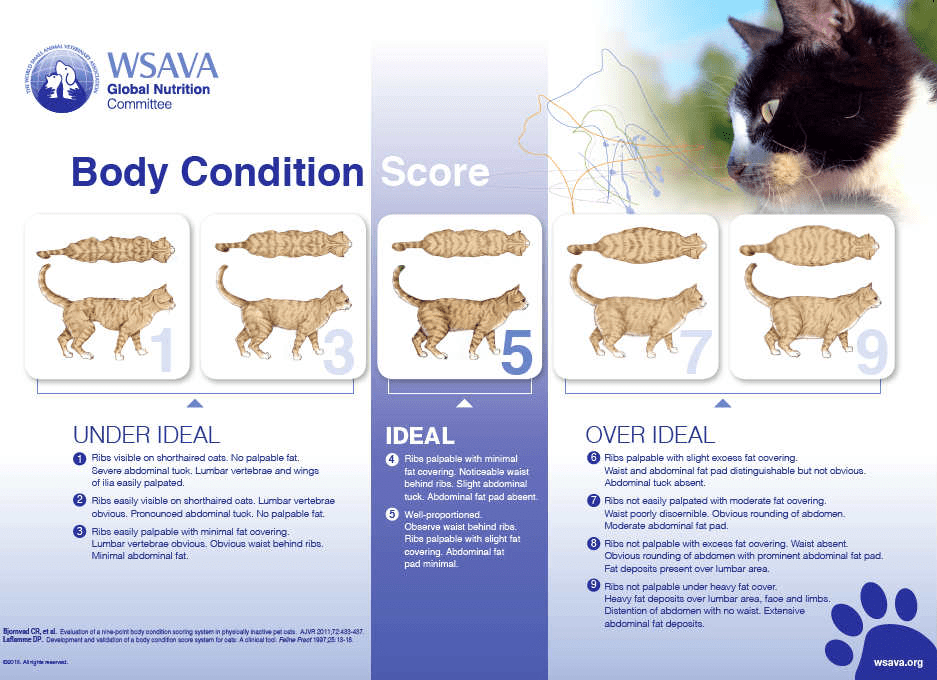
x
In addition to body conditioning scores, there are other ways to determine whether your dog or cat is overweight. Is your normally active cat more sluggish or having trouble jumping? Maybe her coat has lost its sheen, and instead, you find mats and hair loss? Oftentimes a cat will overgroom if she feels uncomfortable or anxious. The next time you take your dog for a walk, check his collar – is it tighter than usual? Has he slowed down or stopped walking altogether? On walks, monitor your dog’s breathing –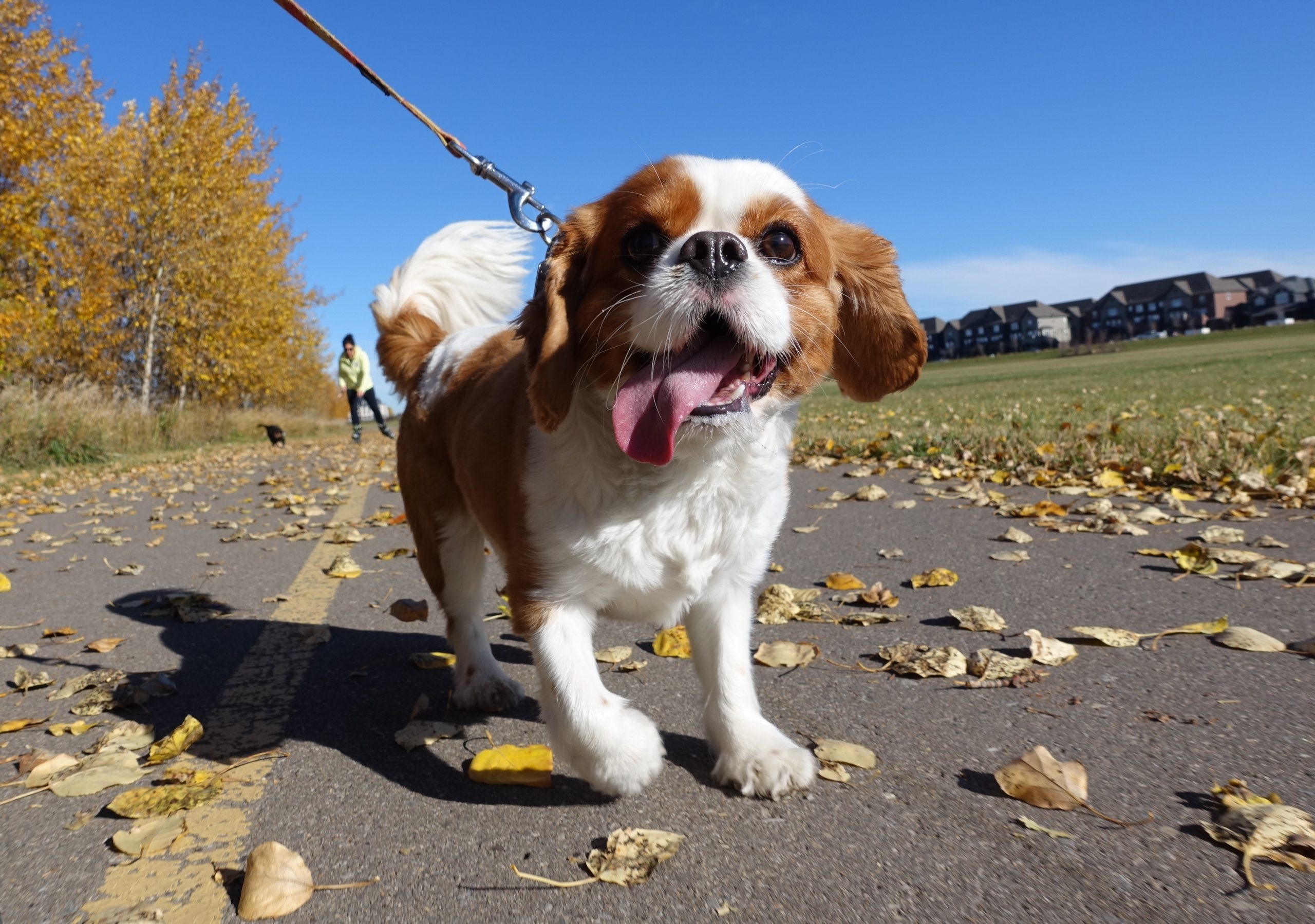 excessive panting and shortness of breath are unhealthy signs.
excessive panting and shortness of breath are unhealthy signs.
Extra weight = health problems
Pets with a healthy weight are healthier pets. “Your pet will have a longer life span and be happier overall,” explained Dr. Shields. In addition to emotional issues like depression, overweight pets can suffer from severe health problems, such as:
- Osteoarthritis
- Risk of ACL tears
- Diabetes
- Breathing problems
- Extra anesthetic risk
- Kidney issues/cardiovascular issues
- Urinary tract disease
- Skin problems
- Risks of cancer
How to prevent your pet from gaining too much weight
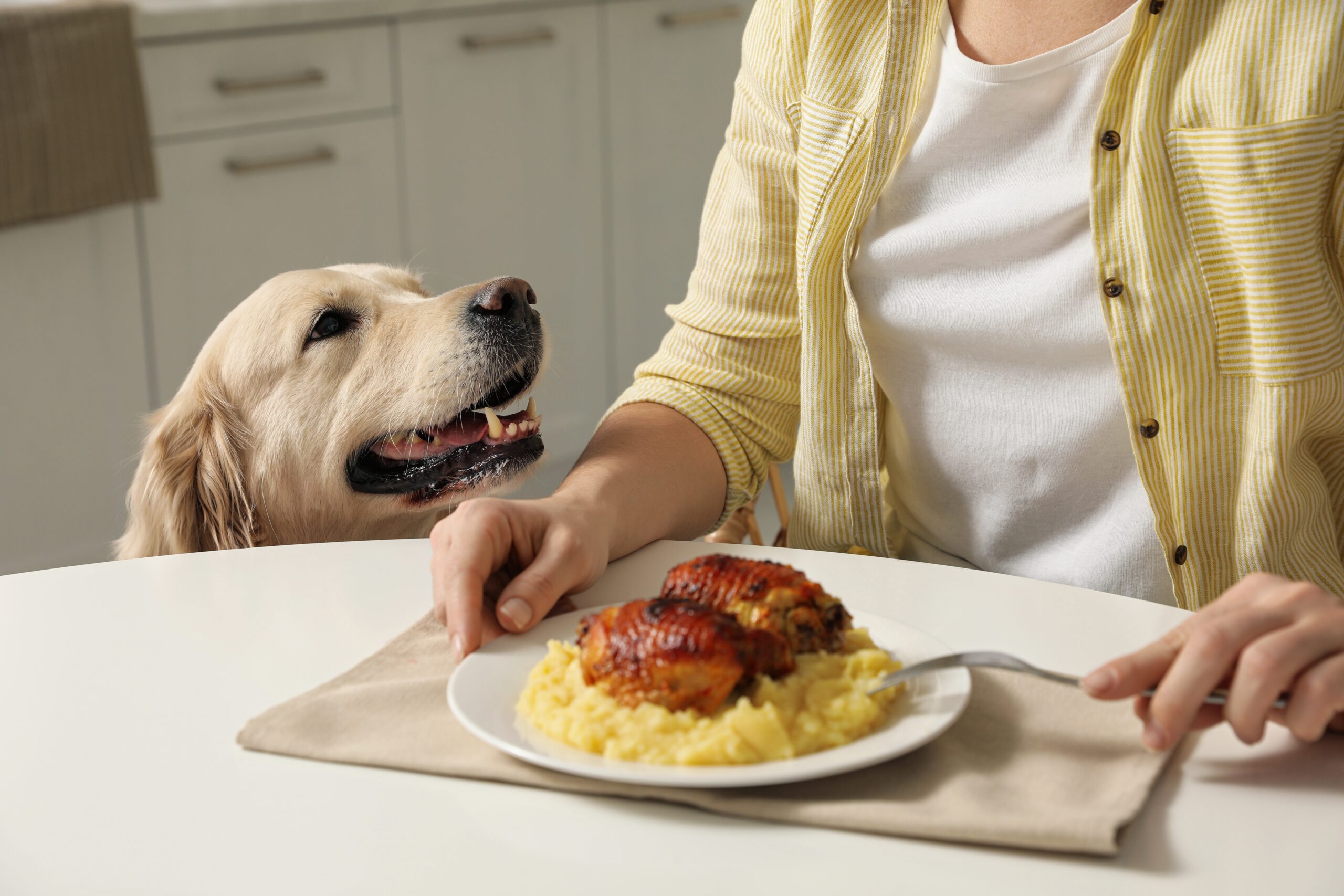 “The first step to losing weight is to cut out treats, especially human food,” says Dr. Shields. Make sure all household members are on the same page. Keeping extra treats from your dog or cat won’t help if someone (like a child) sneaks them in.
“The first step to losing weight is to cut out treats, especially human food,” says Dr. Shields. Make sure all household members are on the same page. Keeping extra treats from your dog or cat won’t help if someone (like a child) sneaks them in.
“This is a common issue I hear about,” said Dr. Shields. “How a pet’s diet is thwarted because someone else in the house loves to give treats.” If someone in your house likes to give your pet treats to show affection, make sure the treats are low-calorie. Dr. Shields suggests carrots, green beans, or squash for dogs. For cats, fresh or frozen green beans, broccoli, and cauliflower.
Finally, remember that your pet shouldn’t lose a lot of weight too quickly. Weight loss goals for dogs should be between 1 and 2% of body weight per week and 0.5 to 1% for cats when aiming for ideal weight. “If patients lose weight too quickly, they may become ill or miss out on appropriate nutrients, which can lead to other health issues,” said Dr. Shields.
Other ways to help control your pet’s weight:
- Avoid “free feeding” meals. Designate specific times when you will give your dog or cat food instead of leaving the bowl or saucer on the floor all day. Remove the bowl or saucer after your pet has finished eating.
- Use a measuring cup when preparing meals. Refrain from guessing how much food to give your pet. Be precise with portions.
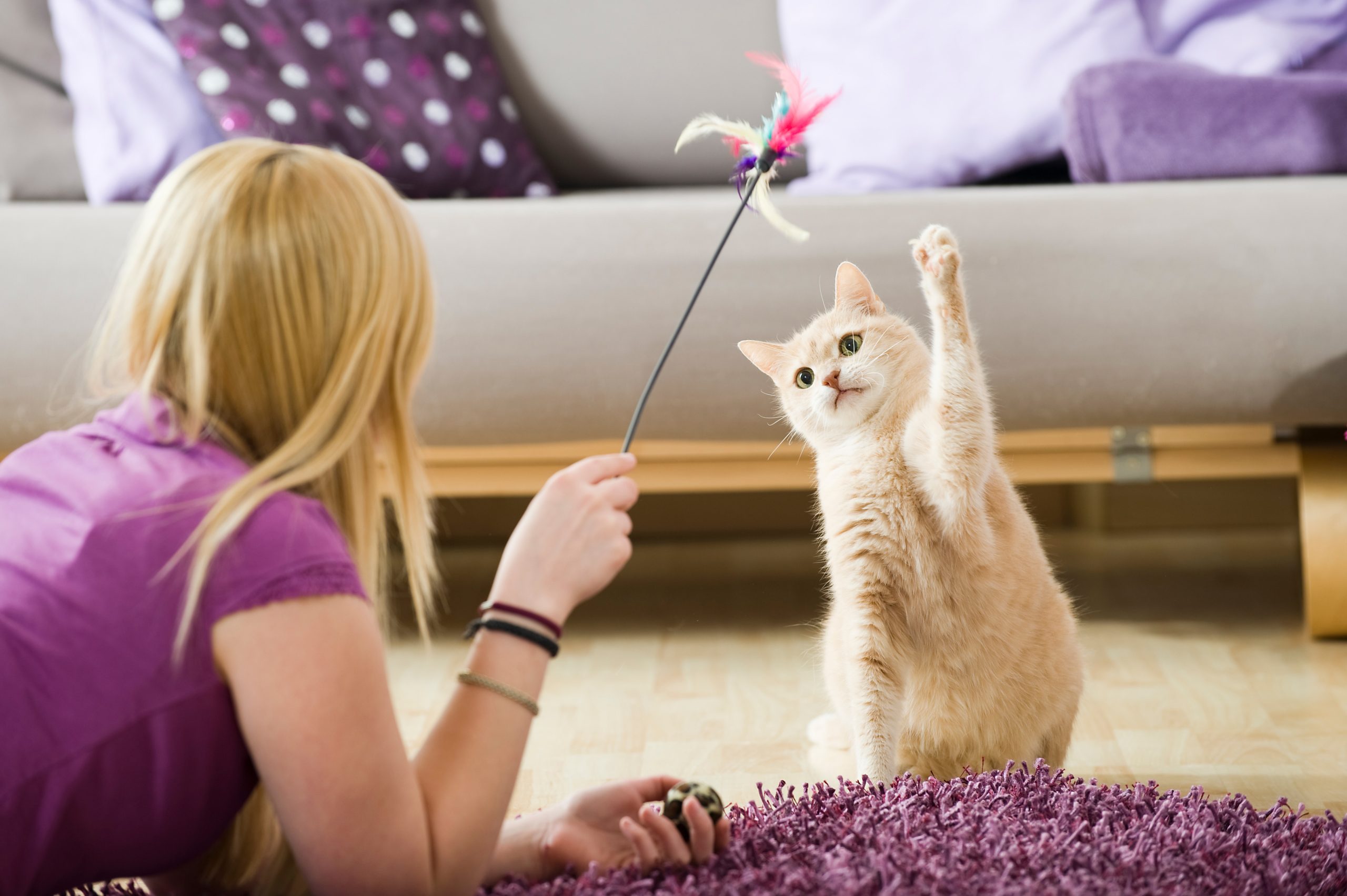 Alternatively, a food scale can be used to weigh meals.
Alternatively, a food scale can be used to weigh meals. - Remember that food labels are just guidelines. Depending on how much exercise your pet is doing and how old they are, they may need more or fewer calories/nutrients. Pet food labels should serve as a starting point, but specific amounts should depend on your pet’s energy needs.
- Consult your veterinarian. Review your pet’s current food intake and see if a prescription diet is more beneficial than an over-the-counter one.
- Do regular weight checks. Since you see your pet every day, you may not notice a gradual increase in weight. Regular weight checks are essential if you only bring your pet to the vet yearly.
- Regular exercise daily. Walk your dog more often, or throw the ball around a bit more. While maintaining a regular exercise regimen is a little more difficult for cats, laser lights and feathered wands keep them on their toes. Some owners have been able to train their cats to walk outside on a leash, and investing in a cat wheel could also help your feline friend get some much-needed exercise.
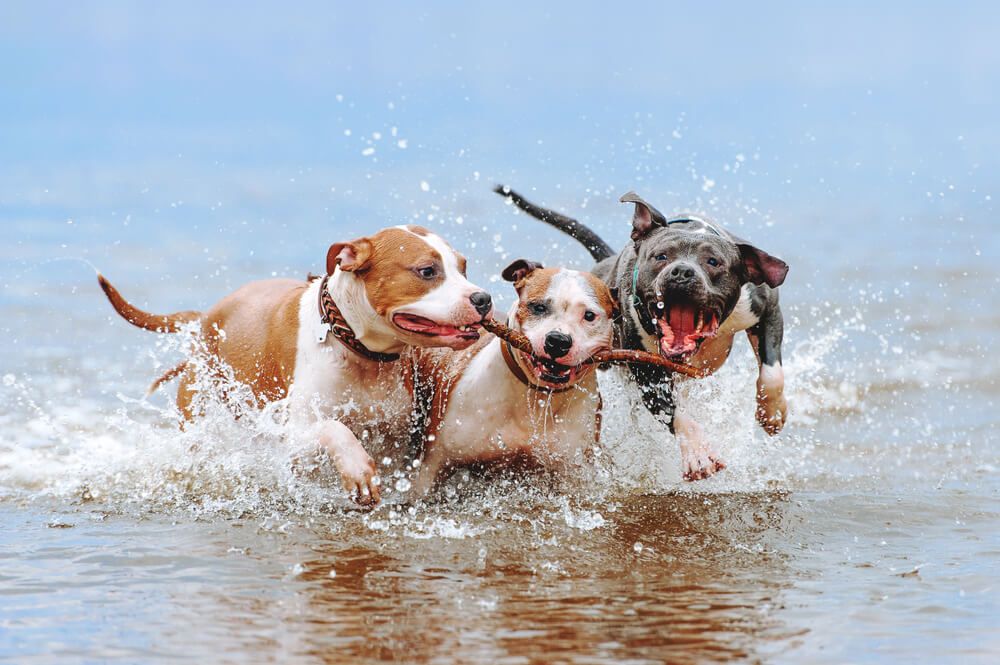
x
x
Are you interested in reading more about keeping your pet at a healthy weight? Below are links to additional articles by MSPCA-Angell doctors to help you and your pet.
Weight: The Struggle Is Real
https://www.mspca.org/angell_services/weight-the-struggle-is-real/
What Is a Healthy Size for My Pet
https://www.mspca.org/angell_services/what-is-a-healthy-size-for-my-pet/
5 Simple Ways to Improve Your Dog’s Quality of Life
https://www.mspca.org/angell_services/improve-dogs-quality-life/
The Skinny on Pet Diets
https://www.mspca.org/pet_resources/the-skinny-on-pet-diets/



